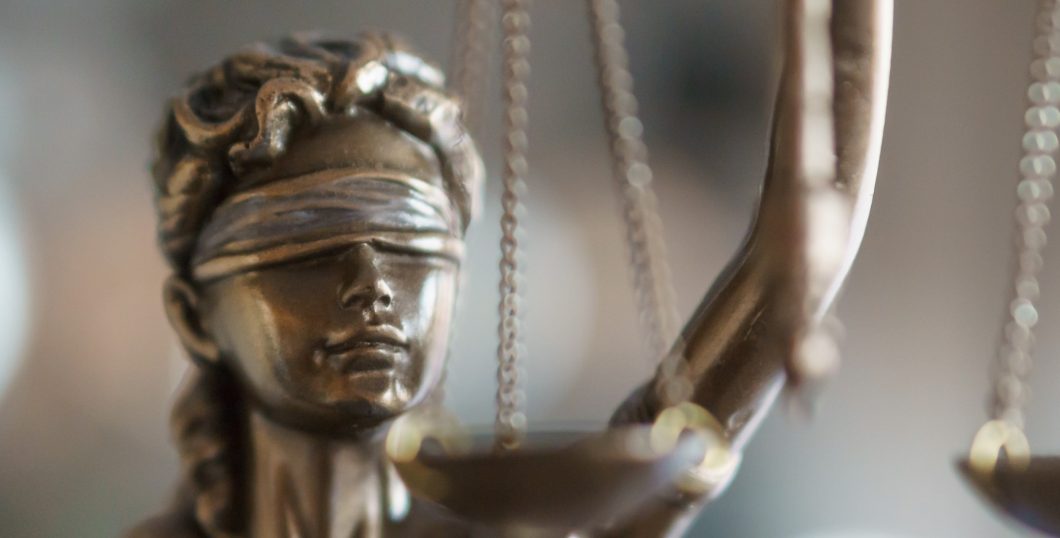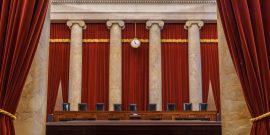Originalism was the way Constitutional law was done until the progressive era came up with the idea of the living constitution.
The Imperative of A Boring Judiciary
As is often the case recently, we’re told we face a crisis. The country stands existentially threatened by an oppressive, authoritarian regime—never mind that this regime was elected within a rounding error, has no discernable popular mandate, and enjoys the support of a paltry majority in one house of Congress, no majority in the other, and a third of state legislative chambers.
We’re told our only hope is a few dozen recent Republican appointees to the federal judiciary. But even they can save us only if they adopt a new interpretive method, one more faithful not to our written laws but to the “project” of our Founding. These judges must transform themselves from boring, black-robed “technocrats” into Herculean “statesmen.”
I agree with “A Better Originalism” that contemporary American jurisprudence has lost touch with the substance of the Founding and has allowed a sophomoric libertarianism to glaze over the substance of the Constitution. Conservatives deserve some blame. I even agree that the solution is, well, a better originalism—an originalism better focused on the Constitution, including its legal, moral, and historical contexts. But I worry that what the authors really want is not a better originalism but instead an atextual supplement to our written laws.
I join Professor Forte in calling for an originalism that is faithful to the Constitution’s text and context. But this leaves no room for the Solomonic judiciary “A Better Originalism” seems to envision. Instead, it requires judges to be modest, technocratic, and, frankly, boring.
Moral Constitution, Amoral Interpretation
Professor Forte offers a calm, measured, and, I think, more enduring account of the present debate, one that reflects the second-order thinking a natural-law jurisprudence requires of judges and lawyers. He acknowledges that conservatives have given unnecessary aid and comfort to judicial overreaches that batter American law. But the thrust of Professor Forte’s piece is that our Constitution—and therefore the originalism most faithful to it—is morally legitimate. The originalist judges “A Better Originalism” finds wanting are deeply devoted to the Constitution. Their loyalty comes in the form of fidelity to the Constitution’s actual meaning. Originalism avoids “grave scandal” by honoring the document itself and the polity that authorized it. Professor Forte endorses an originalism that respects the Constitution, “including, where necessary, its grounding.” On all this, I could not agree more.
But Professor Forte appears to concede a premise I wouldn’t: that originalism itself is a “jurisprudence,” or that it has freestanding moral qualities. Accepting this premise, Professor Forte indulges the original authors’ question whether originalism is morally legitimate. While he answers that question closer to how I would, I think the question itself belies a deep misunderstanding of what originalism really is. And this misunderstanding closely borders the coarse consequentialism that infects “A Better Originalism” and the slurry of other discontented postliberal arguments of recent months.
Originalism, at least as I learned it, is the modest idea that the Constitution means what it says. In other words, the Constitution is to be applied according to its original public meaning, placing oneself in the shoes of the educated reader at the time of ratification. Originalism rests on the idea that as a written, public document, the Constitution has a real, objective meaning, which was fixed in time when it was written. The “quality” of an originalism depends entirely on its fidelity to that meaning. Professor Forte puts it best: “A ‘better originalism’ is better only if it is truer.”
Thus exposed, originalism is an idea so obvious it hardly deserves a name. Its foundational proposition is not legal or moral but ontological: that written words have ascertainable, objective meaning. Not even an author can change that meaning. That’s why it looks so ridiculous when, years after her works are published, a fiction writer reveals an unwritten fact about a key character. The character existed and continues to exist independent of the author and her intentions.
What originalism is not is a “jurisprudence,” a theory of government or of law. It does not tell us how best to organize, bind, or loose the state and its powers. It therefore cannot be good or bad in the same way such a theory might be. Of course, there can be bad applications of originalism; judges might manipulate the text to fit a desired outcome or simply do a bad job determining what a written text actually means. But that does not add or subtract anything of moral consequence from the underlying law.
This, I suspect, is why Professor Forte’s defense of originalism collapses into a defense of our Constitution itself. Is originalism “worthy?” According to Professor Forte, that question turns on the worthiness of the document toward which originalism points.
All sides of the present debate would agree with Professor Forte that whether our Constitution is morally legitimate turns on natural-law precepts and that held up to those precepts, the Constitution is (mostly) morally legitimate. But this doesn’t give originalism any moral qualities. As a mere method of reading, originalism is not itself in line with or opposed to the jurisprudence of the Founding. The contrary argument of “A Better Originalism” relies entirely on a consequentialist reading of originalism, laying at its feet the failings of all who purport to implement it. Those implementations may have moral qualities, but that does not mean originalism does.
The real work of moral reasoning—the real work of jurisprudence—precedes any sort of interpretation. Instead, it comes with creation, i.e., with legislating. We can and should debate the moral qualities of our laws. And if they’re found wanting, we should change our laws and our jurisprudence. But that is the job of the writer, not the reader.
Immoral Originalism
And yet “A Better Originalism” blames the reader, nailing to the door of the conservative cathedral a list of grievances, among them Bostock, Bakke, June Medical Services, Obergefell, and Roe. We are told constitutional originalism and statutory textualism have proven insufficient to fight back.
But as the authors acknowledge, most of these cases don’t even pretend to rely on textualism or originalism. As to the few that do, the authors don’t seem to think they are actually consistent with written law. So is their beef really with originalism? Or is it with bad originalism, originalism that misinterprets written law?
The answer, as the authors conspicuously concede, is not non-originalism but a better originalism. What the authors call a better originalism, though, seems not to be reorientation toward our written laws but instead rewriting laws to fit moral reasoning. This isn’t originalism at all; it’s authorship.
While originalism is an amoral tool, the same cannot be said of any “interpretive theory” that replaces, ignores, or supplements written law. Such a theory crosses the line between interpretation and creation, turning the reader (the judge) into the author (the legislator). This transforms it into something closer to a jurisprudence, and it is subject to a sort of moral scrutiny originalism is not.
If we really are in a jurisprudential or political crisis, the answer lies among our laws’ authors: our legislators and, frankly, us, the people who elect them.
Subjected to such scrutiny, any atextual theory of “interpretation” must fail. Any interpretation that amends, replaces, or erases written law is not really interpretation—it is lawmaking. Some judges are candid about this endeavor. Judge Posner, for example, routinely admitted that he ignored written laws and decided cases on a balance of the equities, as if there were simply no statutes at all. Surely, the authors of “A Better Originalism” would admit that regardless of the merits of Judge Posner’s moral reasoning, he worked a grave disservice on his court, litigants who appeared in it, and our republic as a whole. Why should he grate at us any more than a judge who alters the law but labels it “interpretation”? In addition to Judge Posner’s usurpation, that latter judge is guilty of pernicious deception.
Professor Forte writes that what is at stake here is the very Constitution. I would go further: it is the very right to govern ourselves. We are a republic, and we have delegated to certain offices the authority to enact laws. We have not given that authority to the federal judiciary. Originalism and textualism are the judiciary’s implementation of that principle. Without them, legislatures cannot enact laws that mean what they say. The irony is that a “moral originalism,” supplementing imperfect statutes with judicial reasoning, is pointedly immoral, the “grave scandal” Professor Forte warns against.
A Boring Judiciary
“A Better Originalism” only half acknowledges this concern, promising us a benevolent judiciary, oriented toward the natural law and correct moral reasoning. Neither Professor Forte nor I would contest that there is a correct, ascertainable moral resolution to cases like Roe or Bakke. But I don’t trust many judges—even the saviors “A Better Originalism” would anoint—to find it. Even well-educated, well-intentioned judges are not angels. As the present list of boondoggles shows, they fail frequently and with horrible consequences. Nothing will change this. And giving judges license to employ their own moral reasoning contrary to written law will exacerbate the problem.
I, too, seek a better originalism, and I agree that the hallmark of this better originalism would be a renewed emphasis on our nation’s natural-law foundation. Today’s textualism and originalism are in dire need of repair on this front. They are often acontextual and rife with sophistry. Bostock is the best example of this deficiency, relying on a childish word game to avoid the inescapable conclusion that no single educated reader in 1964 would’ve thought “sex” meant “sexual orientation.”
This better originalism, in practice, would boil down to serious, critical, even pedantic textual exegesis. It would be a boring, arduous endeavor, involving the scouring of historical texts and meditation on the moral tradition that undergirds the Founding. The key is that it would be concerned only with accuracy to written law.
Thus, it wouldn’t allow the judge to employ moral reasoning directly to adjudicate cases, even when that reasoning survives the natural-law scrutiny to which Professor Forte has subjected the Constitution. The truth, as he suggests, is that judges are not our founders. They are not statesmen. They do not govern or lead anyone. They have no authority to make, alter, or improve law. Their fidelity to written law is the first—and last—marker of their quality.
One last point of “heated agreement,” as Professor Arkes would say: contemporary lawyers are not adequately trained in our moral tradition. We aren’t really even trained in jurisprudence. My alma mater is one of only a handful of law schools that requires a course in jurisprudence. It comes as no surprise that a whole generation of elite lawyers finds itself unable to read laws in moral or historical context. Perhaps requiring such a course in all law schools would slowly form a bench and bar more committed to the Constitution, assured of its moral legitimacy, informed of its meaning, and steeped in its natural-law tradition. More importantly, it may form lawyers-cum-legislators capable of writing better laws. But it would also lead to a firm rejection of judicial oligarchy as a solution to judicial infidelity.
If we really are in a jurisprudential or political crisis, the answer lies among our laws’ authors: our legislators and, frankly, us, the people who elect them. Our failures have been aggravated by judges who think they know better, engaging in illegitimate lawmaking masquerading as textual interpretation. But the solution is not more illegitimate lawmaking.
The solution involves the hardest work of democracy: the bottom-up transformation of hearts and minds. It starts with church services, school-board meetings, and family dinners. It has as much to do with little-league baseball games as with the Civil Rights Act or the due process clauses. Its pinnacle is a virtuous, educated populace, which would enact sound, civic-minded legislation, mostly in our statehouses and city halls. The best federal judges can manage is to stay out of the way.
The best they can do is to stay boring.


